In the modern world of business, E-commerce has revolutionized how we shop and sell online. Choosing Best Ecommerce platforms offer small businesses is a cost-effective way to reach a wider audience and grow their online presence. As the world becomes more reliant on online shopping, small businesses need to choose the right E-commerce platform to remain competitive and successful in the market.
This article will explore the 10+ best E-commerce platforms for small businesses in 2024. Our selection of platforms is based on several criteria, including ease of use, pricing, features, customization options, and security. We have also included a comparison of the top 5 platforms to help small businesses decide which platform suits their needs.
Whether you are starting a new online store or looking to switch to a different platform, this article will provide the information needed to choose the best E-commerce platform for your small business.
Importance of Best Ecommerce Platforms for small businesses:
- Increased reach: E-commerce allows small businesses to reach a wider audience beyond their local area, opening up the possibility of global reach. In the United States, the number of online shoppers has steadily increased over the years. Nearly 79% have made purchases online.
- Cost-effective: Setting up an online store is generally more cost-effective than a physical store, reducing the upfront costs of starting a business.
- Convenience: Online shopping is convenient for consumers, allowing them to shop anywhere and anytime.
- Increased sales: An online store can increase sales for small businesses, providing customers with more options to browse and purchase products.
- Customer data: E-commerce platforms provide valuable data on customer behavior, enabling small businesses to personalize their offerings and marketing strategies.
- Flexibility: Online stores are open 24/7, allowing small businesses to operate outside of traditional business hours.
- Brand building: E-commerce allows small businesses to establish and strengthen their brand presence through online stores and social media channels.
- Competitive edge: E-commerce allows small businesses to compete with larger businesses in the market.
- Reduced overheads: Running an online store typically requires fewer staff and lower overhead costs such as rent, utilities, and maintenance, enabling small businesses to reinvest savings into growing their business.
- Improved customer experience: E-commerce platforms offer a seamless and hassle-free shopping experience, which can increase customer loyalty and repeat purchases.

Criteria for selecting E-commerce platforms:
Certainly! When choosing an E-commerce platform for your small business, it is crucial to consider several critical criteria to ensure that you select the platform that best suits your needs. Here are the main points to keep in mind:
- Ease of use: The platform should be user-friendly and easy to navigate, with intuitive tools and a clear dashboard that allows you to manage your store efficiently.
- Pricing: Consider the platform’s pricing model and ensure it is within your budget. Some platforms may charge a monthly fee, while others may take a percentage of each transaction.
- Features: Look for a platform that provides the features and tools you need to run your business effectively. This may include features like inventory management, marketing tools, shipping and tax calculators, and more.
- Customization options: The platform should allow you to customize the look and feel of your store to reflect your brand and make it stand out from the competition.
- Security: The platform should be secure, with built-in encryption and secure payment processing to protect your customers’ sensitive information.
Considering these criteria, you can find an E-commerce platform that meets your needs and helps your small business grow.

Top 10 E-commerce platforms for small businesses in 2024
1 Weebly
 Weebly is a drag-and-drop website builder that enables businesses to create professional-looking websites and online stores.
Weebly is a drag-and-drop website builder that enables businesses to create professional-looking websites and online stores.
Advantages of Weebly:
- Ease of use: Weebly is easy to use and requires no technical expertise, making it a good choice for small businesses and individuals.
- Integration: Weebly can be integrated with a range of third-party apps, including payment gateways and shipping providers.
- Mobile responsiveness: Weebly’s website and online store templates are mobile responsive, ensuring your website looks great on any device.
- Support: Weebly offers a range of support options, including email, phone, and live chat support, as well as a comprehensive help center and community forum.
Key features of Weebly:
- Website builder: Weebly’s website builder enables businesses to create professional-looking websites with customizable themes and templates.
- Online store builder: Weebly’s online store builder allows businesses to create an online store with customizable product pages, shopping carts, and checkout.
- Marketing tools: Weebly offers a range of marketing tools, including email marketing and SEO tools.
- Inventory management: Weebly’s inventory management tools enable businesses to track and manage their inventory in real time.
Pros of Weebly:
- Easy to use.
- Integration.
- Mobile responsiveness.
- Marketing tools.
Cons of Weebly:
- Limited customization: While Weebly offers a range of customization options, the design flexibility is limited compared to other website builders.
- Transaction fees: Weebly charges a transaction fee on each sale, which can be a disadvantage for businesses with high sales volume.
Pricing:
Weebly offers a range of pricing plans, starting from $0/month for the Free plan up to $38/month for the Performance plan. The transaction fees are waived for the Business plan and above.
In conclusion, Weebly is a great choice for small businesses and individuals who want to create a professional-looking website or online store with ease. While it may not be the best choice for businesses with complex e-commerce needs, it is a good choice for those who want an easy-to-use website builder with integrated e-commerce functionality.
Check Weebly Features and Offers

2 Sellfy
 Sellfy is an e-commerce platform that enables creators and entrepreneurs to sell digital and physical products online.
Sellfy is an e-commerce platform that enables creators and entrepreneurs to sell digital and physical products online.
Advantages of Sellfy:
- Ease of use: Sellfy is easy to use, making it an excellent choice for beginners.
- Affordable: Sellfy offers affordable pricing plans that make it accessible to small businesses and individuals.
- Digital product focus: Sellfy specializes in selling digital products, which means that it offers features specifically designed for this type of product.
- Payment processing: Sellfy offers a range of payment options, including credit cards, PayPal, and Apple Pay.
Key features of Sellfy:
- Online store builder: Sellfy’s online store builder makes it easy to create and customize an online store with a range of templates.
- Digital product features: Sellfy offers a range of features specifically designed for selling digital products, including instant delivery and the ability to sell subscriptions.
- Marketing tools: Sellfy offers a range of marketing tools, including social media integration and email marketing.
- Analytics: Sellfy provides detailed analytics that enables businesses to track sales and customer behavior.
Pros of Sellfy:
- Digital product focus.
- Affordable pricing plans.
- Payment processing.
- Easy to use.
Cons of Sellfy:
- Limited design customization: While Sellfy offers a range of templates, the design customization options are somewhat limited.
- Limited integrations: Sellfy has limited integrations compared to other e-commerce platforms.
Pricing:
Sellfy offers a range of pricing plans, starting from $19/month for the Starter plan, up to $89/month for the Premium plan. The transaction fees are waived for all plans.
In conclusion, Sellfy is an excellent choice for businesses that want to sell digital products online. While it may not be the best choice for businesses that require extensive design customization or integrations, it is a solid choice for individuals and small businesses that want to sell digital products with ease and affordability.
Check Sellfy Features and Offers
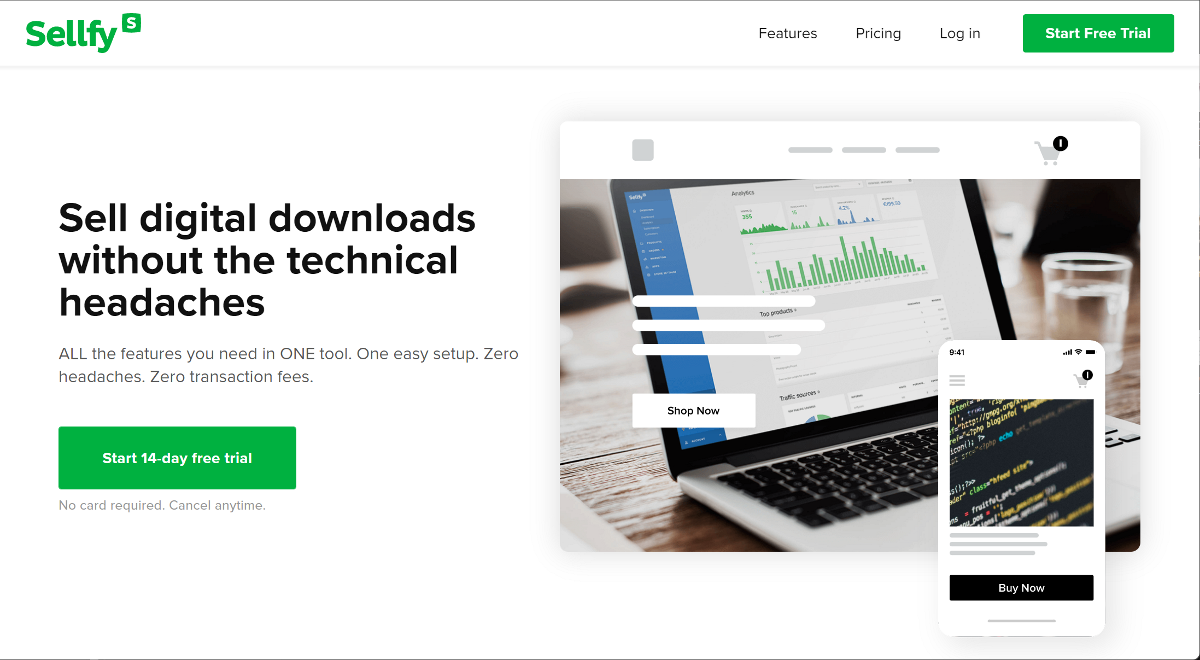
3 Ecwid
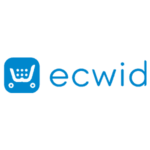 Ecwid is a cloud-based e-commerce platform that enables businesses to sell products online.
Ecwid is a cloud-based e-commerce platform that enables businesses to sell products online.
Advantages of Ecwid:
- Ease of use: Ecwid is easy to use and requires no technical expertise, making it a good choice for small businesses and individuals.
- Integration: Ecwid can be integrated with a range of website builders and platforms, including WordPress, Wix, and Squarespace.
- Multi-channel selling: Ecwid enables businesses to sell products across multiple channels, including Facebook, Instagram, and Amazon.
- Mobile responsive: Ecwid’s storefronts are mobile responsive, ensuring that your products look great on any device.
- Support: Ecwid offers a range of support options, including email, phone, and live chat support, as well as a comprehensive help center and community forum.
Key features of Ecwid:
- Storefront builder: Ecwid’s storefront builder enables businesses to create a professional-looking online store with customizable themes and templates.
- Order management: Ecwid’s order management tools allow businesses to manage orders, process payments, and track shipments.
- Inventory management: Ecwid’s inventory management tools enable businesses to track and manage their inventory in real time.
- Marketing tools: Ecwid offers a range of marketing tools, including email marketing and abandoned cart recovery.
Pros of Ecwid:
- Easy to use.
- Integration.
- Multi-channel selling.
- Mobile responsiveness.
Cons of Ecwid:
- Limited customization: While Ecwid offers a range of customization options, the design flexibility is somewhat limited compared to other e-commerce platforms.
- Transaction fees: Ecwid charges a transaction fee on each sale, which can be a disadvantage for businesses with high sales volume.
Pricing:
Ecwid offers a range of pricing plans, starting from $0/month for the Venture plan up to $99/month for the Unlimited plan. The transaction fees are waived for the Venture plan, while the Business plan and above have no transaction fees.
In conclusion, Ecwid is a great choice for small businesses and individuals who want to sell products online across multiple channels. While it may not be the best choice for businesses with complex e-commerce needs, it is a good choice for those who want an easy-to-use and integrated e-commerce platform.
Check Ecwid Features and Offers
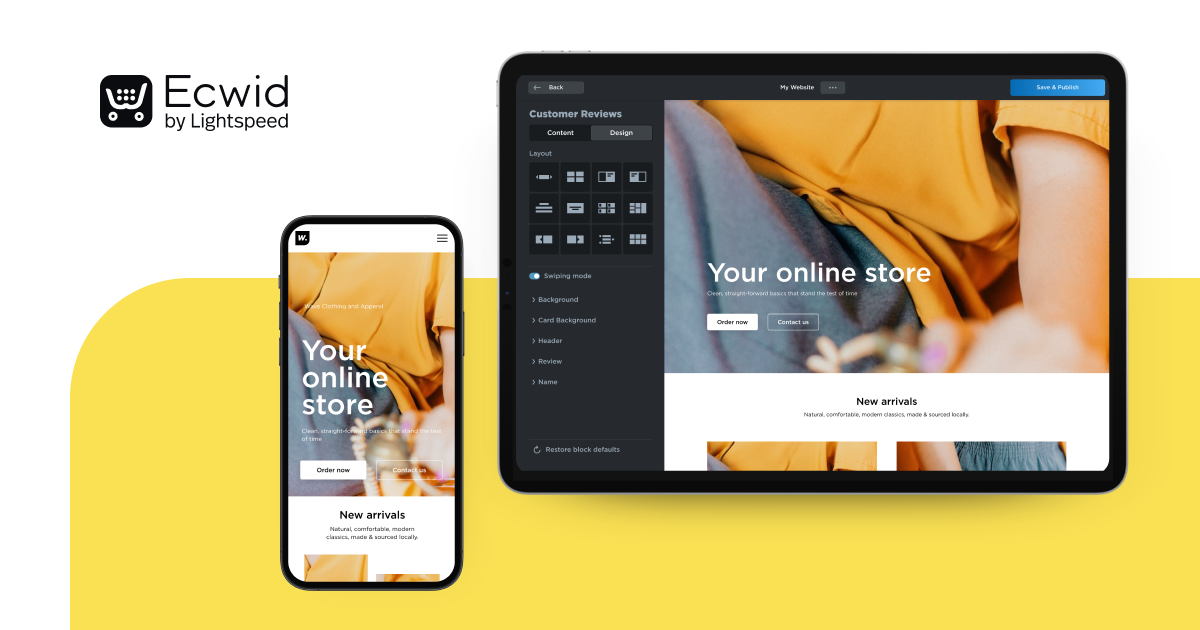
4 Shopify
 Shopify is one of the top Ecommerce platforms, serving over a million businesses worldwide. It offers a range of features and benefits that make it an attractive option for small businesses looking to sell their products online.
Shopify is one of the top Ecommerce platforms, serving over a million businesses worldwide. It offers a range of features and benefits that make it an attractive option for small businesses looking to sell their products online.
Advantages of Shopify:
- User-friendly interface: Shopify is easy to use, even for beginners, with a user-friendly interface and intuitive navigation.
- Flexible customization: Shopify offers a range of customization options, including templates and themes, allowing businesses to create a unique online store that reflects their brand.
- Built-in payment processing: Shopify provides built-in payment processing, so businesses can accept credit card payments without having to integrate with third-party payment gateways.
- Marketing tools: Shopify offers a range of marketing tools, including social media integration, SEO features, and email marketing, to help businesses attract and retain customers.
- Customer support: Shopify offers 24/7 customer support, with live chat and email support and a comprehensive help center.
Key features of Shopify:
- Online store builder: Shopify’s online store builder allows businesses to create a fully functional online store with ease.
- Order management: Shopify offers order management features that enable businesses to track orders, manage inventory, and fulfill orders efficiently.
- Mobile responsiveness: Shopify stores are mobile responsive, meaning they can be accessed and used on mobile devices without any loss of functionality.
- App integrations: Shopify offers a range of app integrations, including accounting software, email marketing tools, and shipping software, to enhance the platform’s functionality.
Pros of Shopify:
- User-friendly interface and intuitive navigation.
- Flexible customization options.
- A comprehensive range of features and tools.
- Built-in payment processing and marketing tools.
Cons of Shopify:
- Additional transaction fees may apply if not using Shopify Payments.
- The cost of app integrations can add up, making the platform more expensive.
Pricing:
Shopify offers a range of pricing plans, starting from $29/month for the Basic Shopify plan up to $299/month for the Advanced Shopify plan. Additional transaction fees may apply if not using Shopify Payments.
In conclusion, Shopify is a feature-rich E-commerce platform that provides businesses with the tools and features needed to build and manage a successful online store. With its flexible customization options, intuitive user interface, and built-in payment processing, Shopify is a popular choice for small businesses selling their products online.

5 Squarespace
 Squarespace is a famous website builder that provides users with the tools to create professional-looking websites and online stores.
Squarespace is a famous website builder that provides users with the tools to create professional-looking websites and online stores.
Advantages of Squarespace:
- Easy to use: Squarespace offers a user-friendly interface that makes it easy for anyone to create a website or online store, even with no coding or design experience.
- Design templates: Squarespace offers a range of professionally designed templates that can be easily customized to suit the needs of your business.
- E-commerce capabilities: Squarespace offers a fully integrated e-commerce platform, enabling businesses to sell products and services online.
- Mobile responsiveness: All Squarespace templates are mobile responsive, ensuring your website looks great on any device.
- Customer support: Squarespace offers a comprehensive help center, community forum, and email support, ensuring users can access support when needed.
Key features of Squarespace:
- Website builder: Squarespace’s website builder allows businesses to create and customize their website with ease.
- E-commerce platform: Squarespace’s e-commerce platform provides businesses with the tools to sell products online, including a shopping cart, inventory management, and order processing.
- Custom domains: Squarespace enables users to purchase and connect custom domains to their websites.
- Analytics: Squarespace offers an integrated analytics platform that provides users with valuable insights into website traffic and customer behavior.
Pros of Squarespace:
- User-friendly interface and intuitive navigation.
- Professional-looking design templates.
- Integrated e-commerce capabilities.
- Mobile responsiveness.
Cons of Squarespace:
- Limited customization options compared to other website builders.
- No third-party app store, meaning users must rely on Squarespace’s tools and features.
Pricing:
Squarespace offers a range of pricing plans, starting from $12/month for the Personal plan up to $40/month for the Advanced plan. E-commerce features are included in the Business and Advanced plans, which start at $18/month and $40/month, respectively.
In conclusion, Squarespace is a popular website builder that offers businesses an easy-to-use platform with professional-looking design templates and integrated e-commerce capabilities. While it may have limited customization options compared to other website builders and no third-party app store, Squarespace is a good choice for businesses looking to create a simple, professional-looking website or online store.

6 BigCommerce
 BigCommerce is a cloud-based e-commerce platform that allows businesses to create and manage their online store.
BigCommerce is a cloud-based e-commerce platform that allows businesses to create and manage their online store.
Advantages of BigCommerce:
- E-commerce capabilities: BigCommerce provides a fully integrated e-commerce platform, making it easy for businesses to sell products and services online.
- Flexibility: BigCommerce offers a range of customization options, allowing businesses to tailor their website to their specific needs.
- Scalability: BigCommerce can accommodate businesses of all sizes, from small startups to large enterprises.
- Mobile responsiveness: All BigCommerce templates are mobile responsive, ensuring your website looks great on any device.
- Support: BigCommerce offers a range of support options, including email, phone, and live chat support, as well as a comprehensive help center and community forum.
Key features of BigCommerce:
- E-commerce platform: BigCommerce’s e-commerce platform provides businesses with the tools they need to sell products online, including a shopping cart, inventory management, and order processing.
- Customization options: BigCommerce offers a range of customization options, including creating custom templates and adding third-party apps.
- SEO tools: BigCommerce offers a range of SEO tools that can help businesses improve their search engine rankings.
- Payment processing: BigCommerce supports a range of payment gateways, making it easy for businesses to accept payments from customers.
Pros of BigCommerce:
- Robust e-commerce capabilities.
- Customization options.
- Scalability.
- Mobile responsiveness.
Cons of BigCommerce:
- Learning curve: BigCommerce can be more complex to use than other best ecommerce platforms, requiring some learning.
- Pricing: BigCommerce can be more expensive than other ecommerce platforms, particularly for larger businesses.
Pricing:
BigCommerce offers a range of pricing plans, starting from $29.95/month for the Standard plan up to $299.95/month for the Enterprise plan. E-commerce features are included in all plans.
In conclusion, BigCommerce is a powerful e-commerce platform that offers businesses a range of customization options and robust e-commerce capabilities. While it can be more complex to use and more expensive than other best ecommerce platforms, it is a good choice for businesses looking for scalability and flexibility.

7 Wix
 Wix is a cloud-based website builder that allows businesses to create and manage their online presence.
Wix is a cloud-based website builder that allows businesses to create and manage their online presence.
Advantages of Wix:
- Ease of use: Wix is very easy to use and requires no technical expertise, making it a good choice for small businesses and individuals.
- Customization options: Wix offers a range of customization options, including creating custom templates and adding third-party apps.
- Flexibility: Wix can accommodate businesses of all sizes, from small startups to large enterprises.
- Mobile responsiveness: All Wix templates are mobile responsive, ensuring that your website looks great on any device.
- Support: Wix offers a range of support options, including email, phone, and live chat support, as well as a comprehensive help center and community forum.
Key features of Wix:
- Website builder: Wix’s website builder provides businesses with the tools they need to create a website, including a drag-and-drop editor and customizable templates.
- E-commerce platform: Wix’s e-commerce platform provides businesses with the tools they need to sell products online, including a shopping cart, inventory management, and order processing.
- SEO tools: Wix offers a range of SEO tools that can help businesses improve their search engine rankings.
- App market: Wix offers a range of third-party apps that can be added to a website to extend its functionality.
Pros of Wix:
- Ease of use.
- Customization options.
- Flexibility.
- Mobile responsiveness.
Cons of Wix:
- Limited design flexibility: While Wix offers a range of customization options, the design flexibility is limited compared to other website builders.
- E-commerce limitations: Wix’s e-commerce platform is not as robust as other best ecommerce platforms.
Pricing:
Wix offers a range of pricing plans, starting from $14/month for the Combo plan, up to $49/month for the VIP plan. E-commerce features are included in the Business and Enterprise plans.
In conclusion, Wix is an easy-to-use website builder that offers businesses a range of customization options and flexibility. While there may be better choices for businesses with complex e-commerce needs, it is good for small businesses and individuals who want to create a professional online presence.

8 Volusion
 Volusion is a cloud-based e-commerce platform that provides businesses with everything they need to build and run their online store.
Volusion is a cloud-based e-commerce platform that provides businesses with everything they need to build and run their online store.
Advantages of Volusion:
- Ease of use: Volusion is easy to use, making it an excellent choice for small and medium-sized businesses.
- Comprehensive features: Volusion offers a comprehensive set of features that can help businesses run and grow their online store.
- Great support: Volusion has a dedicated support team that is available 24/7 to assist with any issues.
- Security: Volusion is Level 1 PCI compliant, which means that it meets the highest security standards for processing and storing credit card information.
Key features of Volusion:
- Online store builder: Volusion’s online store builder makes it easy to create and customize an online store with a range of themes and templates.
- Marketing tools: Volusion offers a range of marketing tools, including SEO, social media, and email marketing.
- Payment processing: Volusion supports a range of payment options, including credit cards, PayPal, and Apple Pay.
- Order management: Volusion’s order management tools enable businesses to manage orders, process payments, and handle shipping and fulfillment.
Pros of Volusion:
- Comprehensive features.
- Good support.
- Security.
- Payment processing.
Cons of Volusion:
- Limited design customization: While Volusion offers a range of themes and templates, the design customization options are somewhat limited.
- Limited integrations: Volusion has limited integrations compared to other e-commerce platforms.
Pricing:
Volusion offers a range of pricing plans, starting from $29/month for the Personal plan up to $299/month for the Premium plan. The transaction fees are waived for all plans.
In conclusion, Volusion is an excellent choice for businesses that want a comprehensive e-commerce platform with great support and security. While there may be better choices for businesses that require extensive design customization or integrations, it is a solid choice for small and medium-sized businesses that want to build and grow their online store.
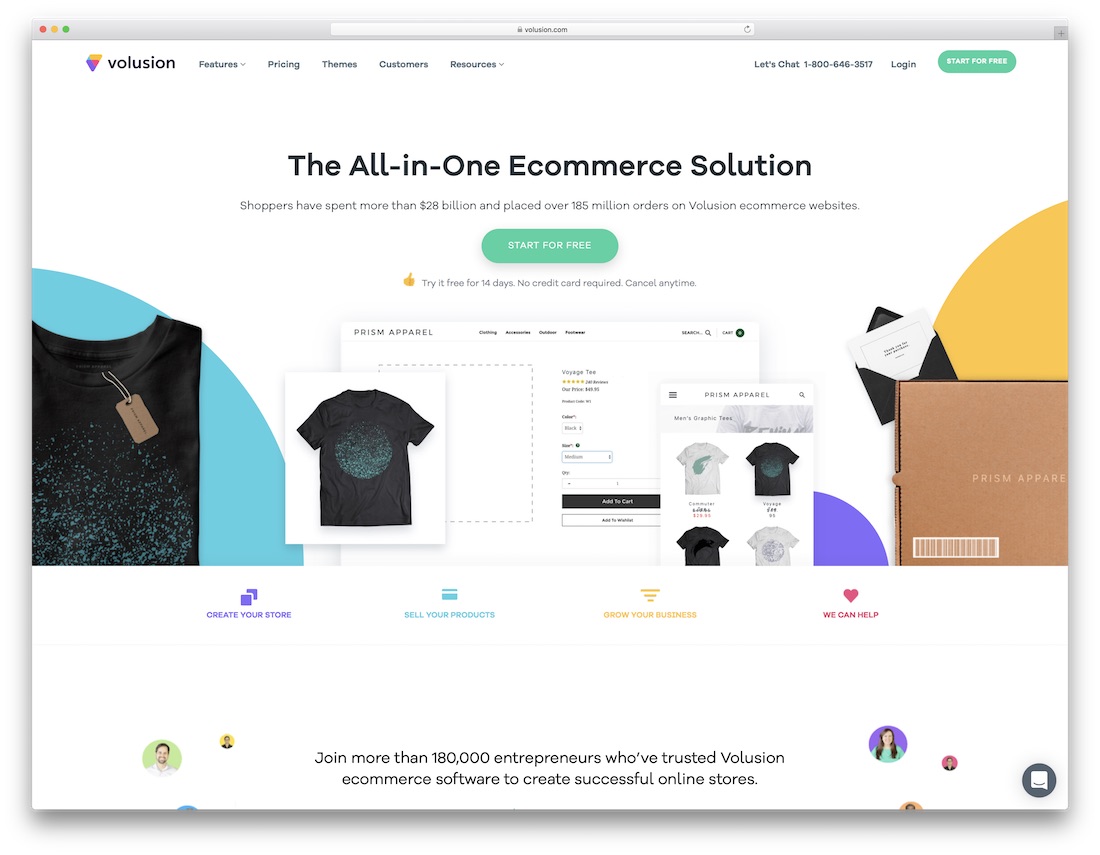
9 Elementor
 Elementor is a popular website builder that is known for its drag-and-drop interface, extensive customization options, and compatibility with WordPress.
Elementor is a popular website builder that is known for its drag-and-drop interface, extensive customization options, and compatibility with WordPress.
Advantages of Elementor:
- Ease of use: Elementor’s drag-and-drop interface is easy to use, making it an excellent choice for beginners.
- Customization options: Elementor offers extensive customization options, including the ability to create custom templates and widgets.
- Compatibility with WordPress: Elementor is a WordPress plugin, which means that it can be used with any WordPress website.
- Developer-friendly: Elementor offers a range of developer-friendly features, including the ability to create custom CSS and JavaScript code.
Key features of Elementor:
- Visual editing: Elementor offers a visual editing interface that allows users to see the changes they make in real time.
- Template library: Elementor offers a range of templates that can be customized to fit any website’s design.
- Custom widgets: Elementor offers a range of custom widgets that can be used to add functionality to any website.
- WooCommerce integration: Elementor is compatible with WooCommerce, making it an excellent choice for e-commerce websites.
Pros of Elementor:
Ease of use.
Customization options.
Compatibility with WordPress.
Developer-friendly.
Cons of Elementor:
Performance: Some users have reported that Elementor can slow down website performance.
Limited SEO options: Elementor offers limited SEO options compared to other website builders.
Pricing:
Elementor offers a range of pricing plans, starting from $49/year for the Personal plan up to $999/year for the Expert plan. The pricing plans differ in terms of the number of websites that can be used and the level of support offered.
In conclusion, Elementor is an excellent choice for anyone who wants to build a website with ease and customization options. While it may not be the best choice for those who require extensive SEO options or the fastest website performance, it is a solid choice for individuals and businesses who want to create a visually appealing website that is easy to use and developer-friendly.

10 ShopWired
ShopWired is a UK-based e-commerce platform that offers a range of features designed to help small and medium-sized businesses sell online.
Advantages of ShopWired:
- UK-based: ShopWired is a UK-based platform, which means that it is designed to meet the specific needs of UK businesses.
- Easy to use: ShopWired offers an easy-to-use interface that makes it easy for businesses to get started with selling online.
- Customization options: ShopWired offers a range of customization options, including the ability to create custom themes and templates.
- Security: ShopWired offers a range of security features, including SSL encryption and secure payment gateways.
Key features of ShopWired:
- Custom themes: ShopWired offers a range of custom themes that can be used to create a unique online store.
- Product management: ShopWired offers a range of tools for managing products, including the ability to add product images, descriptions, and prices.
- Payment options: ShopWired offers a range of payment options, including PayPal and Stripe.
- Order management: ShopWired offers a range of tools for managing orders, including the ability to track orders and print packing slips.
Pros of ShopWired:
- UK-based.
- Easy to use.
- Customization options.
- Security.
Cons of ShopWired:
- Limited third-party integrations: ShopWired offers limited third-party integrations compared to other e-commerce platforms.
- Limited design flexibility: ShopWired’s design options are somewhat limited compared to other best ecommerce platforms.
Pricing:
ShopWired offers a range of pricing plans, starting from £29/month for the Basic plan, up to £299/month for the Advanced plan. The pricing plans differ in terms of the number of products that can be sold and the level of support offered.
In conclusion, ShopWired is an excellent choice for UK-based businesses that want an easy-to-use e-commerce platform with a range of customization options and security features. While it may not offer as many third-party integrations as some other e-commerce platforms, it is a solid choice for businesses that want to sell online in the UK.
Check ShopWired Features and Offers
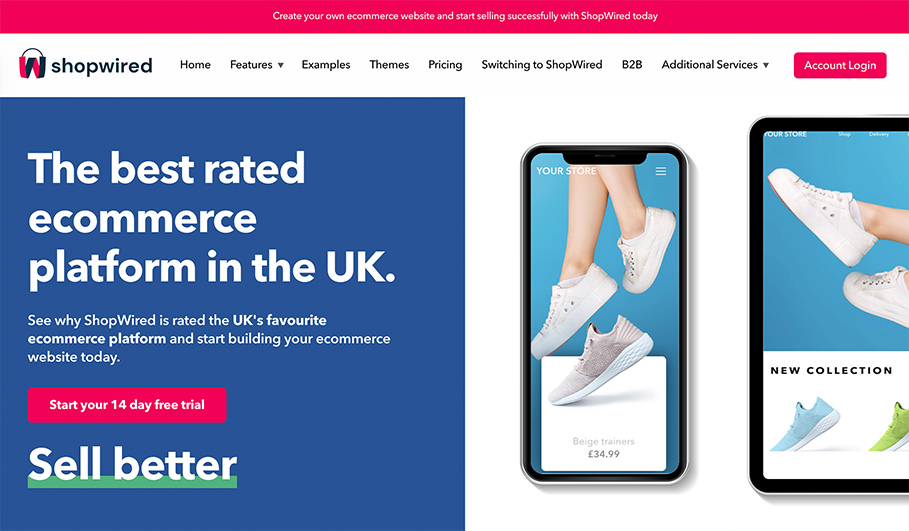
The Future Trends in E-commerce:
There are several emerging trends that are expected to shape the future of e-commerce in the coming years. Here are a few of the most notable ones:
Mobile commerce: With the increasing adoption of mobile devices, it is expected that more and more people will shop on their smartphones and tablets. Therefore, businesses will need to ensure that their online stores are mobile-friendly and optimized for mobile devices. m-commerce sales accounted for around 54% of total e-commerce sales worldwide.
Augmented reality and virtual reality: These technologies are being used to enhance the online shopping experience, allowing customers to visualize products in 3D and in a real-world setting. This can improve customer engagement, increase sales, and reduce returns.
Personalization: With the help of AI and machine learning, businesses can now personalize the online shopping experience for individual customers based on their preferences, search history, and purchase behavior. This can improve customer loyalty and increase sales.
Voice commerce: The popularity of smart speakers and voice assistants is driving the growth of voice commerce. Businesses will need to optimize their online stores for voice search and create voice-activated shopping experiences.
Social commerce: Social media platforms are increasingly becoming a channel for e-commerce, allowing businesses to sell products directly through social media ads and posts. This trend is expected to continue to grow in the coming years.
Sustainability: Consumers are becoming more conscious about the environmental impact of their purchases, and businesses are expected to respond by adopting more sustainable practices and offering eco-friendly products.
Overall, the future of e-commerce is likely characterized by a greater focus on customer experience, personalization, and the use of emerging technologies to create more engaging and intuitive online shopping experiences.

How to choose the right e-commerce Platform:
Here are some key points to consider when choosing the right e-commerce software for your business:
- Determine your needs and goals: Consider your business size, the types of products you sell, your target audience, and your growth projections. This will help you determine the features and functionality you need in an ecommerce platform.
- Consider ease of use: Look for an e-commerce platform that is user-friendly and easy to set up and manage, even if you need more technical expertise. The platform should have intuitive navigation, clear documentation, and helpful customer support.
- Look for customization options: Your ecommerce platform should allow you to customize the look and feel of your online store to match your brand and to meet your specific needs. This includes the ability to create product catalogs, shopping carts, and checkout pages that are tailored to your business.
- Consider payment and shipping options: Your ecommerce platform should support a range of payment options that are convenient for your customers, including credit cards, PayPal, and other digital wallets. It should also have built-in shipping and fulfillment options or integrate with third-party services.
- Security and reliability: Your ecommerce platform should be secure and reliable, with features such as SSL encryption, fraud detection, and regular backups. It should also have a high uptime percentage to ensure your store is always available.
- Pricing and scalability: Consider the pricing model of the ecommerce platform, including any setup fees, transaction fees, or monthly fees. You should also ensure that the platform can scale with your business, whether you are just starting out or looking to expand in the future.
- Reviews and reputation: Look for reviews and feedback from other businesses who have used the platform. This will help you get a sense of the platform’s strengths and weaknesses and whether it is a good fit for your business.
By considering these key points, you can make an informed decision about the right ecommerce platform for your business.

FAQ:
Here are the main frequently asked questions about ecommerce platforms:
Q: What is an ecommerce platform?
A: An ecommerce platform is a software application that allows businesses to create an online store, manage products and inventory, process payments, and fulfill orders. Best ecommerce platforms provide a range of features and tools designed to make it easy for businesses to sell online.
Q: What are the most important factors to consider when choosing an ecommerce platform?
A: When choosing an ecommerce platform, it’s important to consider factors such as ease of use, customization options, payment and shipping options, security, and pricing. Businesses should also consider the size and scale of their operations, as well as their specific needs and goals.
Q: What are the main types of best ecommerce platforms?
A: The main types of ecommerce platforms include hosted platforms, self-hosted platforms, and open source platforms. Hosted platforms are the most popular type of ecommerce platform, as they are easy to use and typically include all the features and tools businesses need to get started. Self-hosted platforms and open source platforms offer more flexibility and customization options, but require more technical expertise to set up and manage.
Q: What are the main benefits of using an ecommerce platform?
A: The main benefits of using an ecommerce platform include the ability to sell products online, reach a wider audience, increase sales and revenue, and streamline operations. Best ecommerce platforms also provide businesses with a range of tools and features designed to help them manage their online store more efficiently.
Q: How much does an ecommerce platform cost?
A: The cost of an ecommerce platform can vary widely depending on the platform, the features and tools included, and the size and scale of the business. Hosted platforms typically charge a monthly fee, which can range from a few dollars to several hundred dollars per month, depending on the features and level of support provided. Self-hosted and open source platforms may require additional costs for hosting, development, and maintenance.

